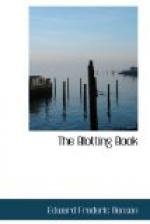After the identification of the body came evidence medical and otherwise that seemed to show beyond doubt the time and manner of his death and the possible motive of the murderer. The base of the skull was smashed in, evidently by some violent blow dealt from behind with a blunt heavy instrument of some sort, and death had probably been instantaneous. In one of the pockets was a first edition of an evening paper published in London on Thursday last, which fixed the earliest possible time at which the murder had been committed, while in the opinion of the doctor who examined the body late on Saturday night, the man had been dead not less than forty-eight hours. In spite of the very heavy rain which had fallen on Thursday night, there were traces of a pool of blood about midway between the clump of bracken where the body was found, and the path over the downs leading from Falmer to Brighton. This, taken in conjunction with the information already given by Mr. Taynton, made it practically certain that the deceased had left London on the Thursday as he had intended to do, and had got out of the train at Falmer, also according to his expressed intention, to walk to Brighton. It would again have been most improbable that he would have started on his walk had the storm already begun. But the train by which his bag was conveyed to Brighton arrived at Falmer at half-past six, the storm did not burst till an hour afterward. Finally, with regard to possible motive, the murdered man’s watch was missing; his pockets also were empty of coin.
This concluded the evidence, and the verdict was brought in without the jury leaving the court, and “wilful murder by person or persons unknown” was recorded.
* * * * *
Mr. Taynton, as was indeed to be expected, had been much affected during the giving of his evidence, and when the inquest was over, he returned to Brighton feeling terribly upset by this sudden tragedy, which had crashed without warning into his life. It had been so swift and terrible; without sign or preparation this man, whom he had known so long, had been hurled from life and all its vigour into death. And how utterly now Mr. Taynton forgave him for that base attack that he had made on him, so few days ago; how utterly, too, he felt sure Morris had forgiven him for what was perhaps even harder to forgive. And if they could forgive trespasses like these, they who were of human passion and resentments, surely the reader of all hearts would forgive. That moment of agony short though it might have been in actual duration, when the murderous weapon split through the bone and scattered the brain, surely brought punishment and therefore atonement for the frailties of a life-time.




